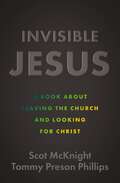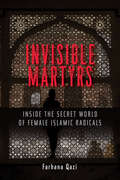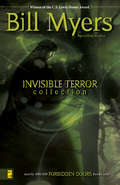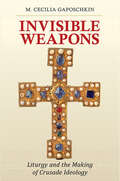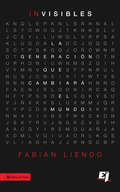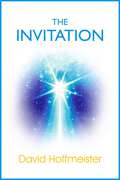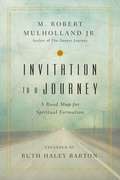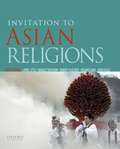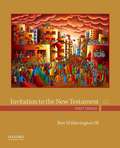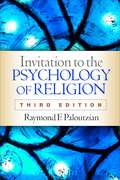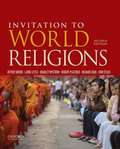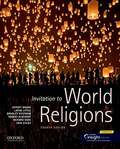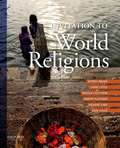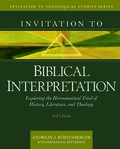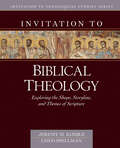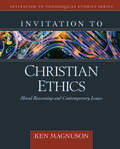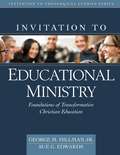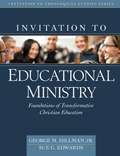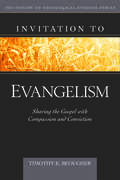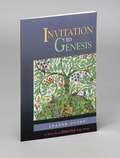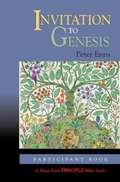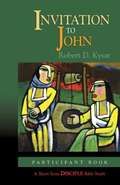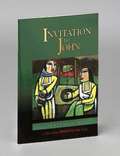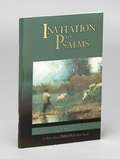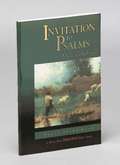- Table View
- List View
Invisible Jesus: A Book about Leaving the Church and Looking for Christ
by Scot McKnight Tommy Preson PhillipsIn recent years, we've seen an increase in the number of Christians who are "deconstructing" their faith, critically analyzing Christianity and finding that it falls short. Many end up leaving behind the beliefs and commitments they formerly held. While many have written on how to reverse this trend, Scot McKnight and Tommy Preson Phillips believe that rather than dismissing these concerns we need to listen more carefully.Deconstructors are uncovering serious weaknesses in today's church--a renewed fundamentalism, toxic leadership, and legalistic thinking among them. Utilizing the results of recent studies by Pew, Gallup, and others, McKnight and Phillips take a careful look at what deconstructors are really saying, seeking to better understand why many are shedding elements of the faith and church of their youth but also engaging in a reconstruction process, finding Jesus afresh. They are losing their religion, but not losing Jesus.Filled with stories of those who have walked the path of deconstruction without losing their faith, Invisible Jesus is a prophetic call to examine ourselves and discern if the faith we practice and the church we belong to is really representative of the Jesus we follow. Each chapter looks at a different topic and offers biblical reflections that call for us to not only better listen, but to change how we live out our faith as followers of Jesus today.
Invisible Martyrs: Inside the Secret World of Female Islamic Radicals
by Farhana QaziFarhana Qazi draws on her background as a pioneering counterterrorism professional and a devout Muslim to offer an insider's view of what drives girls and women to join radical Islamic movements and how we can keep them from making this terrible choice.The first Muslim woman to work for the US government's Counterterrorism Center, Qazi found herself fascinated, even obsessed, by the phenomenon of female extremists. Why, she wondered, would a girl from Denver join ISIS, a radical movement known for its mistreatment of women? Why would a teenage Iraqi girl strap on a suicide bomb and detonate it?From Kashmir to Iraq to Afghanistan to Colorado to London, she discovered women of different backgrounds who all had their own reason for joining these movements. Some were confused, others had been taken advantage of, and some were just as radical and dedicated as their male counterparts. But in each case, Qazi found their choices were driven by a complex interaction of culture, context, and capability that was unique to each woman.This book reframes their stories so readers can see these girls and women as they truly are: females exploited by men. Through hearing their voices and sharing their journeys Qazi gained powerful insights not only into what motivated these women but also into the most effective ways to combat terrorism—and about herself as well. “Through them,” Qazi writes, “I discovered intervention strategies that are slowly helping women hold on to faith as they struggle with versions of orthodox Islam polluted by extremist interpretations. And in the process, I discovered a gentle Islam and more about myself as a woman of faith.”
Invisible Terror Collection
by Bill MyersIn Volume 2 of the bestselling Forbidden Doors fiction series, author Bill Myers presents books 4-6-The Haunting, The Guardian, and The Encounter-which keep readers on the edge of their seats as he tells stories about the young adults who battle dangerous occultic influences in their lives. Biblical truths about spiritual warfare have never been so suspenseful and entertaining.
Invisible Weapons: Liturgy and the Making of Crusade Ideology
by M. Cecilia GaposchkinThroughout the history of the Crusades, liturgical prayer, masses, and alms were all marshaled in the fight against Muslim armies. In Invisible Weapons, M. Cecilia Gaposchkin focuses on the ways in which Latin Christians communicated their ideas and aspirations for crusade to God through liturgy, how public worship was deployed, and how prayers and masses absorbed the ideals and priorities of crusading. Placing religious texts and practices within the larger narrative of crusading, Gaposchkin offers a new understanding of a crucial facet in the culture of holy war.
Invisibles
by Fabián LiendoMuchos han intentado cambiar al mundo pero sino estamos dispuestos a dar la vida, no vale de nada lo que hacemos. Fabián Liendo te desafiará a mirar más allá de la comodidad de tu iglesia o comunidad. No sirve de nada dar lo que te sobra. Debes entregarte por completo a la causa que Dios te ha llamado.En este libro encontrarás una reflexión profunda y poco tradicional de quienes están transformando el mundo desde lo que no vemos. Serás inspirado a la acción, al servicio y a la justicia social a fin de reformar la realidad que vivimos. Fabián, te retará a despertar del sueño y ver que los > están cambiando el mundo y tú querrás ser uno de ellos.
Invitation
by David HoffmeisterBased on an interview of David Hoffmeister by Penelope Chatterton from the TV series &“Awake in the Dream&”. Everything we explore together is for the whole universe. &“Where two or more are gathered… I am there.&” We want to go into this with such great depth and certainty that we can let go of the &“two or more&” and just feel the Presence of I AM.
Invitation To A Journey: A Road Map For Spiritual Formation
by Ruth Haley Barton M. Robert MulhollandM. Robert Mulholland Jr. defines spiritual formation as "the process of being formed in the image of Christ for the sake of others. " Compact and solid, this definition encompasses the dynamics of a vital Christian life and counters our culture's tendency to make spirituality a trivial matter or reduce it to a private affair between "me and Jesus. "In Invitation to a Journey, Mulholland helps Christians new and old understand that we become like Christ gradually, not instantly. Not every personality is suited to an early morning quiet time, so Mulholland frees different personality types to express their piety differently. He reviews the classical spiritual disciplines and demonstrates the importance of undertaking our spiritual journey with (and for the sake of) others. This road map for spiritual formation is profoundly biblical and down to earth. In the finest tradition of spiritual literature, it is a vital help to Christians at any stage of their journey. This edition is revised and expanded by Ruth Haley Barton with a new foreword, spiritual practices and study guide, to provide spiritual direction for individuals and groups seeking spiritual companionship for one another on the journey of transformation.
Invitation To Asian Religions
by Richard Shek Jeffrey Brodd Robert Platzner Layne Little Erin Stiles Bradley NystromFeaturing a unique, consistent, and modular chapter structure - "Teachings," "History," and "Way of Life" - and numerous pedagogical features, Invitation to Asian Religions invites students to explore Hinduism, Buddhism, Jainism, Sikhism, Chinese religions (Confucianism and Daoism), and Shintowith respect and a sense of wonder. This chapter structure enables students to navigate each religion in a consistent and systematic way and helps students to make comparisons between religions. The book describes the essential features of each religion and shows how the religions have responded tobasic human needs and to the cultural contexts in which they developed. The authors also encourage students to develop an appreciation for what religious beliefs and practices actually mean to their adherents. Also available to suit your course needs: Invitation to World Religions, Second Edition: 978-0-19-937836-4 Invitation to Western Religions: 978-0-19-021127-1
Invitation To The New Testament: First Things
by Ben WitheringtonWriting with his usual flair and reader-friendly style, renowned scholar, author, and lecturer Ben Witherington III offers a balanced approach to the New Testament in this faith-friendly introductory text. An ideal textbook for college survey courses, this volume is also captivating reading for seminary students and general readers. <P><P> FEATURES <P><P>* Numerous dynamic color photos keep students engaged <P><P>* Maps and charts provide visual overviews at a glance <P><P>* Marginal definitions bring students up to speed on new concepts <P><P>* Chapter-ending study questions review key ideas and encourage reflection <P><P>* First-century quotations expose students to the world of the New Testament <P><P>* "A Closer Look" boxes cover more advanced topics
Invitation To The Psychology Of Religion, Third Edition
by Raymond F. PaloutzianThe leading undergraduate psychology of religion text, this engaging book synthesizes cutting-edge theories and findings into an accessible account enlivened by personal reflections and contemporary examples. Raymond F. Paloutzian offers an authoritative overview of theoretical and empirical foundations; experiential, developmental, personality, and sociocultural dimensions of religion and spirituality; and clinical implications. Students are also given food for thought about bigger questions--how religion influences their own lives; what beliefs or values they hold most dear; and how to live in a multicultural, multireligious world. Each chapter opens with a brief topic outline and concludes with "Take-Home Messages" and suggestions for further reading.
Invitation To World Religions
by Richard Shek Jeffrey Brodd Robert Platzner Layne Little Brad Nystrom Erin StilesThe book describes the essential features of each religion and shows how the religions have responded to basic human needs and to the cultural contexts in which they developed. The authors also encourage students to develop an appreciation for what religious beliefs and practices actually mean to their adherents.
Invitation To World Religions
by Richard Shek Jeffrey Brodd Robert Platzner Layne Little Erin Stiles Bradley NystromFeaturing a unique, consistent, and modular chapter structure--"Teachings," "History," and "Way of Life"--and numerous pedagogical features, Invitation to World Religions invites students to explore the world's great religions with respect and a sense of wonder. This chapter structure enables students to navigate each religion in a consistent and systematic way and helps students to make comparisons between religions. The book describes the essential features of each religion and shows how they have responded to basic human needs and to the cultural contexts in which they developed. The authors also encourage students to develop an appreciation for what religious beliefs and practices actually mean to their adherents.
Invitation To World Religions
by Richard Shek Jeffrey Brodd Robert Platzner Layne Little Erin Stiles Bradley P. NystromFeaturing a unique, consistent, and modular chapter structure--"Teachings," "History," and "Way of Life"--and numerous pedagogical features, Invitation to World Religions, Third Edition, invites students to explore the world's great religions with respect and a sense of wonder. <P><P>This chapter structure enables students to navigate each religion in a consistent and systematic way and to make comparisons between religions. <P><P>The book describes the essential features of each religion and shows how they have responded to basic human needs and to the cultural contexts in which they developed. <P><P>The authors also encourage students to develop an appreciation for what religious beliefs and practices actually mean to their adherents.
Invitation to Biblical Interpretation: Exploring the Hermeneutical Triad of History, Literature, and Theology (Invitation to Theological Studies)
by Andreas KöstenbergerAn authoritative guide to accurately interpreting and applying God's WordIn this second edition of Invitation to Biblical Interpretation, Andreas Kostenberger leads the reader step-by-step through the process of interpreting and applying God's Word.The primary principle is the hermeneutical triad, which consists of history, literature, and theology. Readers are equipped to explore the historical background of a biblical passage, analyze its literary genre and features, and derive its theological meaning in light of the biblical canon. Numerous examples are provided throughout to illustrate the concepts. A concluding chapter provides direction on practical application, preaching, and helpful tools for Bible study.Additional features include key words and definitions at the end of each chapter, study questions, and practical exercises for applying the material. An appendix lists numerous resources for Bible study, including recommended commentaries for every book of the Bible.The second edition updates these resources, as well as the sources cited throughout, and includes a revised chapter on the Old Testament canon. Instructors, students, pastors, and anyone who desires to interpret Scripture accurately will find this volume to be an indispensable addition to their library.
Invitation to Biblical Theology: Exploring the Shape, Storyline, and Themes of Scripture (Invitation to Theological Studies Series)
by Jeremy M. Kimble Ched SpellmanInvitation to Biblical Theology provides a thorough overview of biblical theology that is accessible for those new to the topic but substantial enough for advanced study. Defining biblical theology as the study of the whole Bible on its own terms, Jeremy Kimble and Ched Spellman begin with a brief history of the discipline followed by a survey of contemporary approaches. They then lay out their own approach, built on the framework of the canon, the covenants, and Christ. Taking God's plan of redemption in Christ as the uniting theme of Scripture, Kimble and Spellman survey the grand storyline of the Bible from Genesis to Revelation, showing how each division of the canon moves the overarching story forward. The following ten chapters survey central and recurring themes of Scripture including kingdom, worship, Messiah and atonement, God's glory, and mission. The authors conclude with reflections on how biblical theology can serve the church as well as the academy.
Invitation to Christian Ethics: Moral Reasoning And Contemporary Issues (Invitation to Theological Studies)
by Ken MagnusonA comprehensive introduction to Christian ethics addressing today’s most challenging moral issuesInvitation to Christian Ethics is an indispensable guide for helping pastors, counselors, and everyday Christians navigate today’s difficult moral questions. Readers will benefit from Ken Magnuson’s survey of ethics from a biblical perspective as well as contemporary theories of moral reasoning. This survey is followed by twelve chapters devoted to some of the thorniest issues Christians encounter today, such as: • Sexuality, including homosexuality, sexual identity, and gender• Marriage and divorce• Infertility and assisted reproductive technologies• Abortion• Physician-assisted suicide• Race relations• Creation care• Capital punishment• Just war, pacifism, and the use of lethal forceMagnuson provides biblical insight into each topic and presents key moral considerations. He also answers specific, practical questions that arise and concludes with a summary of his recommended approach to each issue. Readers will learn how to grapple with difficult moral questions and will receive guidance for some of life’s most challenging ethical conundrums.
Invitation to Educational Ministry: Foundations of Transformative Christian Education (Invitation To Theological Studies)
by George M. Hillman Sue G. EdwardsThis volume will help church staff, parachurch leaders, and small-group teachers become more effective, influential, and creative. After laying a biblical and practical foundation for Christian education, the contributors provide specific guidance on teaching a variety of individuals and groups, including children, adults, singles, seniors, and non-Christians. The final section shares valuable insights on leading small groups, teaching innovatively, and overseeing a healthy educational ministry, among other topics. Each chapter is designed to equip educators with the most relevant information, and includes many useful features: Real-life case studies; Scriptural support; Explanations of key terms and concepts; Practical suggestions; Resources for additional study; Sidebars illustrating best principles and practices.
Invitation to Educational Ministry: Foundations of Transformative Christian Education (Invitation to Theological Studies)
by Sue Edwards George HillmanBecause teaching is at the heart of Christian ministry, the editors of Invitation to Educational Ministry have assembled a team of seasoned experts to present a comprehensive plan of Christian education. This volume will help church staff, parachurch leaders, and small-group teachers become more effective, influential, and creative.After laying a biblical and practical foundation for Christian education, the contributors provide specific guidance on teaching a variety of individuals and groups, including children, adults, singles, seniors, and non-Christians.The final section shares valuable insights on leading small groups, teaching innovatively, and overseeing a healthy educational ministry, among other topics. Each chapter is designed to equip educators with the most relevant information, and includes many useful features:• Real-life case studies• Scriptural support• Explanations of key terms and concepts• Practical suggestions• Resources for additional study• Sidebars illustrating best principles and practices
Invitation to Evangelism: Sharing the Gospel with Compassion and Conviction (Invitation to Theological Studies)
by Timothy BeougherEssential guidance for a lifestyle of sharing God’s good news with a lost world.What exactly does it mean to “evangelize” in a Christian sense? And how is such “evangelizing” supposed to be done? Longtime pastor, evangelist, and professor of evangelism Timothy K. Beougher answers these questions and more from theological, historical, and practical perspectives. Beougher demonstrates God’s goodness in evangelism through relatable anecdotes, Bible teaching, and encouraging instruction. Invitation to Evangelism welcomes believers into the experience of stepping out in faith of behalf of people God loves.Most Christians know that they should be sharing the good news of Jesus Christ with nonbelievers, and most also know they aren’t witnessing very well, or even at all. They need help internalizing the content of gospel proclamation and identifying the best way to go about making evangelism a natural part of their lives. Introduction to Evangelism guides readers through the essential issues of the gospel message, evangelism methods, and witnessing models so they are ready and excited to move out in faith as everyday evangelists.Beougher’s biblical, theological, historical, and practical teaching revolves around following essential aspects of being an evangelist:•Having compassion as the motivation for evangelism•Understanding the good news of Jesus Christ•Seeing lost people as persons God loves•Relying on the power of the Holy Spirit•Paving the way for new believers to share their faith eagerly with others
Invitation to Genesis: A Short-Term DISCIPLE Bible Study
by Dr Peter EnnsThe Leader Guide provides process guidance for weekly group sessions. The Leader Guide understands the role of leader as facilitator of small-group sessions. Procedures for guiding sessions include: directions for using related video segments, and questions for discussion.This study takes groups into the rich tapestry of Genesis exploring the interaction between God and very human people - pride, family relationships, conflict and journey all showcase the best known stories of Creation, Noah, Abraham, Isaac, Jacob and Rebekah and Joseph.The video reflects the drama of the Genesis stories, first with selected text dramatized by an actor, and then study writer, Peter Enns interviews a scholar to help unpack the meaning and the mystery in the stories.Participants for this Invitation to Genesis do not have to have an in-depth knowledge of the Bible to enjoy and benefit from participation. Reading just two chapters of Genesis a week, they will discover the life altering stories that will invite them to follow Christ as true disciples. This eleven-week study includes a participant book outlining daily reading assignments for group preparations, a leader guide suggesting discussion activities for use in the 60–90-minute weekly meeting, and a video component providing interpretation and context for the biblical texts. Sessions: The Beginning...and What Went Wrong Another Beginning: The Flood...and What Went Wrong Another Beginning: Abraham and the Patriarchs Abraham and a Glimpse to the Future The Promise Fulfilled: Isaac Another Beginning: Jacob and the Uneasy Birth of a People Jacob: The Struggle Continues Another New Beginning: Joseph and the Family of Israel The Trek Into Egypt An End and Another Beginning: Israel's Story
Invitation to Genesis: A Short-Term DISCIPLE Bible Study (Short-term Disciple Studies)
by Dr Peter EnnsThis study takes groups into the rich tapestry of Genesis exploring the interaction between God and very human people - pride, family relationships, conflict and journey all showcase the best known stories of Creation, Noah, Abraham, Isaac, Jacob and Rebekah and Joseph.The video reflects the drama of the Genesis stories, first with selected text dramatized by an actor, and then study writer, Peter Enns interviews a scholar to help unpack the meaning and the mystery in the stories.Participants for this Invitation to Genesis do not have to have an in-depth knowledge of the Bible to enjoy and benefit from participation. Reading just two chapters of Genesis a week, they will discover the life altering stories that will invite them to follow Christ as true disciples. This eleven-week study includes a participant book outlining daily reading assignments for group preparations, a leader guide suggesting discussion activities for use in the 60–90-minute weekly meeting, and a video component providing interpretation and context for the biblical texts. Sessions: The Beginning...and What Went Wrong Another Beginning: The Flood...and What Went Wrong Another Beginning: Abraham and the Patriarchs Abraham and a Glimpse to the Future The Promise Fulfilled: Isaac Another Beginning: Jacob and the Uneasy Birth of a People Jacob: The Struggle Continues Another New Beginning: Joseph and the Family of Israel The Trek Into Egypt An End and Another Beginning: Israel's Story
Invitation to John: A Short-Term DISCIPLE Bible Study
by Robert D. KysarThe invitation from Christ is: "Come and see, Follow me". Experience the magnificent passages in John including the I am statements (I am the truth, the life and the way, I am the living water and more). Revisit stories only told in John's gospel including Nicodemus, Mary Magdalene and the raising of Lazarus. During the weekly video segments, travel into the scripture as you hear the Word, experience the grand artwork connected with each story and interview the scholar. Each week wraps up with a small group discussion on video to spark your own conversation.Participants for this Invitation to John do not have to have an in-depth knowledge of the Bible to enjoy and benefit from participation. Reading just two chapters of John a week, they will discover the life altering stories that will invite them to follow Christ as true disciples. This eleven-week study includes a participant book outlining daily reading assignments for group preparations, a leader guide suggesting discussion activities for use in the 60–90-minute weekly meeting, and a video component providing interpretation and context for the biblical texts. Robert D. Kysar, Bandy Professor Emeritus of Preaching and New Testament, Candler School of Theology, is a noted scholar on the Gospel of John. He has authored numerous articles and books, including a revised edition of John: The Maverick Gospel; Preaching John; and most recently Voyages With John: Charting the Fourth Gospel.Session titles and scripture: Come and See (John 1–2) How Is It Possible? (John 3–4) Taste for Yourself (John 5–6) To Believe or Not to Believe (John 7–8) Are We Blind? (John 9–10) I Couldn't Believe My Eyes! (John 11–12) Would You Believe It? (John 13–14) What Time Is It? (John 15–16) Look Out! (John 17–18) Believing Without Seeing (John 19–20) Do You See Him? (John 21)
Invitation to John: A Short-Term DISCIPLE Bible Study
by Robert D. KysarThe Leader Guide provides process guidance for weekly group sessions. The Leader Guide understands the role of leader as facilitator of small-group sessions. Procedures for guiding sessions include: directions for using related video segments, and questions for discussion.The invitation from Christ is: "Come and see, Follow me". Experience the magnificent passages in John including the I am statements (I am the truth, the life and the way, I am the living water and more). Revisit stories only told in John's gospel including Nicodemus, Mary Magdalene and the raising of Lazarus. During the weekly video segments, travel into the scripture as you hear the Word, experience the grand artwork connected with each story and interview the scholar. Each week wraps up with a small group discussion on video to spark your own conversation.Participants for this Invitation to John do not have to have an in-depth knowledge of the Bible to enjoy and benefit from participation. Reading just two chapters of John a week, they will discover the life altering stories that will invite them to follow Christ as true disciples. This eleven-week study includes a participant book outlining daily reading assignments for group preparations, a leader guide suggesting discussion activities for use in the 60–90-minute weekly meeting, and a video component providing interpretation and context for the biblical texts. Robert D. Kysar, Bandy Professor Emeritus of Preaching and New Testament, Candler School of Theology, is a noted scholar on the Gospel of John. He has authored numerous articles and books, including a revised edition of John: The Maverick Gospel; Preaching John; and most recently Voyages With John: Charting the Fourth Gospel.Session titles and scripture: Come and See (John 1–2) How Is It Possible? (John 3–4) Taste for Yourself (John 5–6) To Believe or Not to Believe (John 7–8) Are We Blind? (John 9–10) I Couldn't Believe My Eyes! (John 11–12) Would You Believe It? (John 13–14) What Time Is It? (John 15–16) Look Out! (John 17–18) Believing Without Seeing (John 19–20) Do You See Him? (John 21)
Invitation to Psalms: A Short-Term DISCIPLE Bible Study
by AbingdonThe Leader Guide provides process guidance for weekly group sessions. The Leader Guide understands the role of leader as facilitator of small-group sessions. Procedures for guiding sessions include: directions for using related video segments, and questions for discussion.Make a deeper connection to the world of the Psalms so that these well known scriptures can help you give voice to all aspects of our human experience–joy, faith, uncertainty and sorrow.During two weekly video segments, experience a varied presentation of individual Psalm texts, including dramatic reading, music, dance, and images. Listen to insights into specific Psalms presented by one of two biblical scholars through an informal, roundtable conversation formatIdeal experience for adults who are interested in the practice of prayer and worship and would like to connect prayer practice with Scripture. The study is accessible for adults with little prior Bible experience.Participants for this Invitation to Psalms do not have to have an in-depth knowledge of the Bible to enjoy and benefit from participation. Reading just two chapters of Psalms a week, they will discover the life altering stories that will invite them to follow Christ as true disciples. This ten-week study includes a participant book outlining daily reading assignments for group preparations, a leader guide suggesting discussion activities for use in the 60–90-minute weekly meeting, and a video component providing interpretation and context for the biblical texts. Michael Jinkins is an ordained Minister of Word and Sacrament in the Presbyterian Church (USA). He serves as Dean of Austin Presbyterian Theological Seminary, where he is also Professor of Pastoral Theology. Michael is the author of eleven books, including In the House of the Lord: Inhabiting the Psalms of Lament, Invitation to Theology, and Letters to New Pastors.Sessions: Word of God, Words of Prayer The Prayer Book of God’s People Praying the Psalms The Language of the Heart A Geography of the Imagination A Theology of the Imagination Lament and Praise Grace and Repentance Love and Wrath Hallelujah and Amen
Invitation to Psalms: A Short-Term DISCIPLE Bible Study
by Michael JinkinsMake a deeper connection to the world of the Psalms so that these well known scriptures can help you give voice to all aspects of our human experience–joy, faith, uncertainty and sorrow.During two weekly video segments, experience a varied presentation of individual Psalm texts, including dramatic reading, music, dance, and images. Listen to insights into specific Psalms presented by one of two biblical scholars through an informal, roundtable conversation formatIdeal experience for adults who are interested in the practice of prayer and worship and would like to connect prayer practice with Scripture. The study is accessible for adults with little prior Bible experience.Participants for this Invitation to Psalms do not have to have an in-depth knowledge of the Bible to enjoy and benefit from participation. Reading just two chapters of Psalms a week, they will discover the life altering stories that will invite them to follow Christ as true disciples. This ten-week study includes a participant book outlining daily reading assignments for group preparations, a leader guide suggesting discussion activities for use in the 60–90-minute weekly meeting, and a video component providing interpretation and context for the biblical texts. Michael Jinkins is an ordained Minister of Word and Sacrament in the Presbyterian Church (USA). He serves as Dean of Austin Presbyterian Theological Seminary, where he is also Professor of Pastoral Theology. Michael is the author of eleven books, including In the House of the Lord: Inhabiting the Psalms of Lament, Invitation to Theology, and Letters to New Pastors.Sessions: Word of God, Words of Prayer The Prayer Book of God’s People Praying the Psalms The Language of the Heart A Geography of the Imagination A Theology of the Imagination Lament and Praise Grace and Repentance Love and Wrath Hallelujah and Amen
